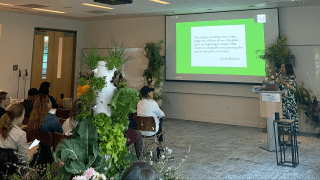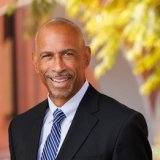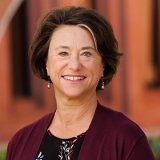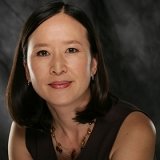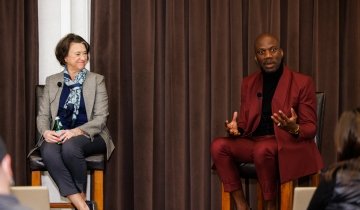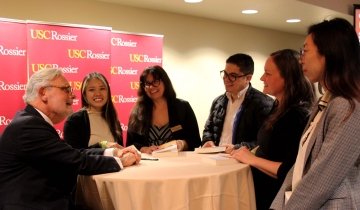On April 4, USC Rossier and Bio Equity Ed, a community-based non-profit in Los Angeles, hosted a conference on “Climate Change and Environmental Justice: The Role of Schools in Planning for a Sustainable Future.” Artists, activists, public officials, school board members, higher education leadership, district administrators and teachers convened by the dozens in the LEED-certified building of the California Endowment. Panelists and conferencegoers alike shared their commitments to transforming communities and building alliances, to sustain just and meaningful change in the face of our changing climate.
In her opening remarks, Veda Ramsay-Stamps EdD ’23, USC Rossier alumna and founder of Bio Equity Ed, described how disconnected communities of color in most urban areas feel from nature, owing to historic injustices. She recounted the stories of Black and Brown students in Los Angeles, those who grow up miles from idyllic beaches and mountains but who know only the concrete beneath the nearest river and their feet. Artist Lauren Bon then described her work to bend and regenerate the L.A. River, providing water to the Los Angeles State Historic Park, which had once been a trainyard.
As Dean Pedro Noguera told the audience in his introduction: “Every problem facing the world today is an educational challenge. We have to learn what we need to do. And if we think of the climate crisis this way, as an educational challenge, the problem itself becomes less despairing.” Dean Noguera urged those in attendance not only to meet but to act, not merely to educate others to be resilient in the face of climate change but to inspire its solutions.
In breakout sessions, Distinguished Professor Gale Sinatra moderated a discussion with Imogen Herrick PhD ’23, a USC Rossier alumna now at the University of Kansas, and Paula Carbone, USC Rossier professor of clinical education. They described successful pedagogical approaches to inspiring students into climate action, integrating students’ own identities and experiences. USC Rossier Professor Tracy Poon Tambascia spoke with researchers and architects about how to transform schools and schoolyards into biophilic environments. Community organizers and non-profit leaders shared their experiences greening urban environments with trees and micro-farms, especially in convincing schools to plant more gardens. Teachers and administrators from California’s climate-sensitive Central Valley described their fleets of electric school buses and innovative sustainability programs and curriculum to move students of color.
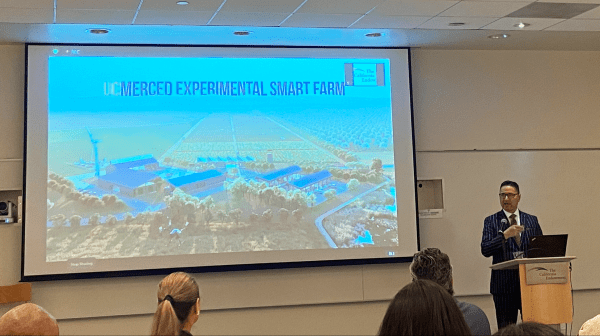
The conference’s keynote speaker, University of California, Merced Chancellor Juan Sánchez Muñoz outlined his university’s foundational commitment to sustainability in the Central Valley. At UC Merced, which was already the first research university in the United States to be carbon-neutral, Chancellor Muñoz is helping construct a center for sustainable agriculture, a model for what higher education can contribute to environmental sustainability and surrounding communities.
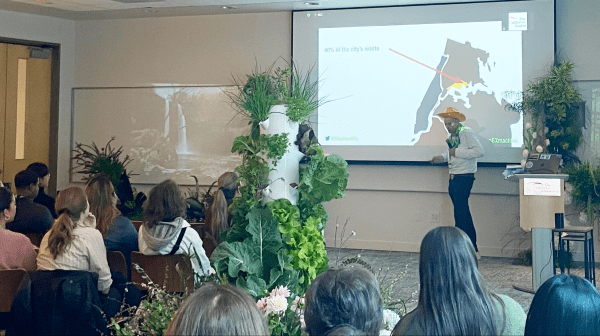
In an especially rousing plenary session, Stephen Ritz, a high school teacher from the South Bronx, described how he had turned his classroom and his school, in one of the most economically and environmentally deprived communities in the United States, into a vegetable garden. Ritz the subject of an upcoming documentary called Generation Growth, has not only shared his plant-based curriculum with governments and classrooms around the world, through his Green Bronx Machine non-profit, he turned the very conference room in which he spoke into an organic, immersive experience with greenery.
Naomi Riley, representing Congresswoman Sydney Kamlager-Dove of California’s 37th District, who had directed millions of dollars to sustainability projects, told those in attendance early in the day, “the folks closest to the problem are usually closest to the solution.” Most often, no one is closer to the problems in our communities than the teachers and administrators of local schools. It is they, as Noguera said, who “must begin to think creatively and critically to address climate change and give hope to kids who believe there is no future.”

